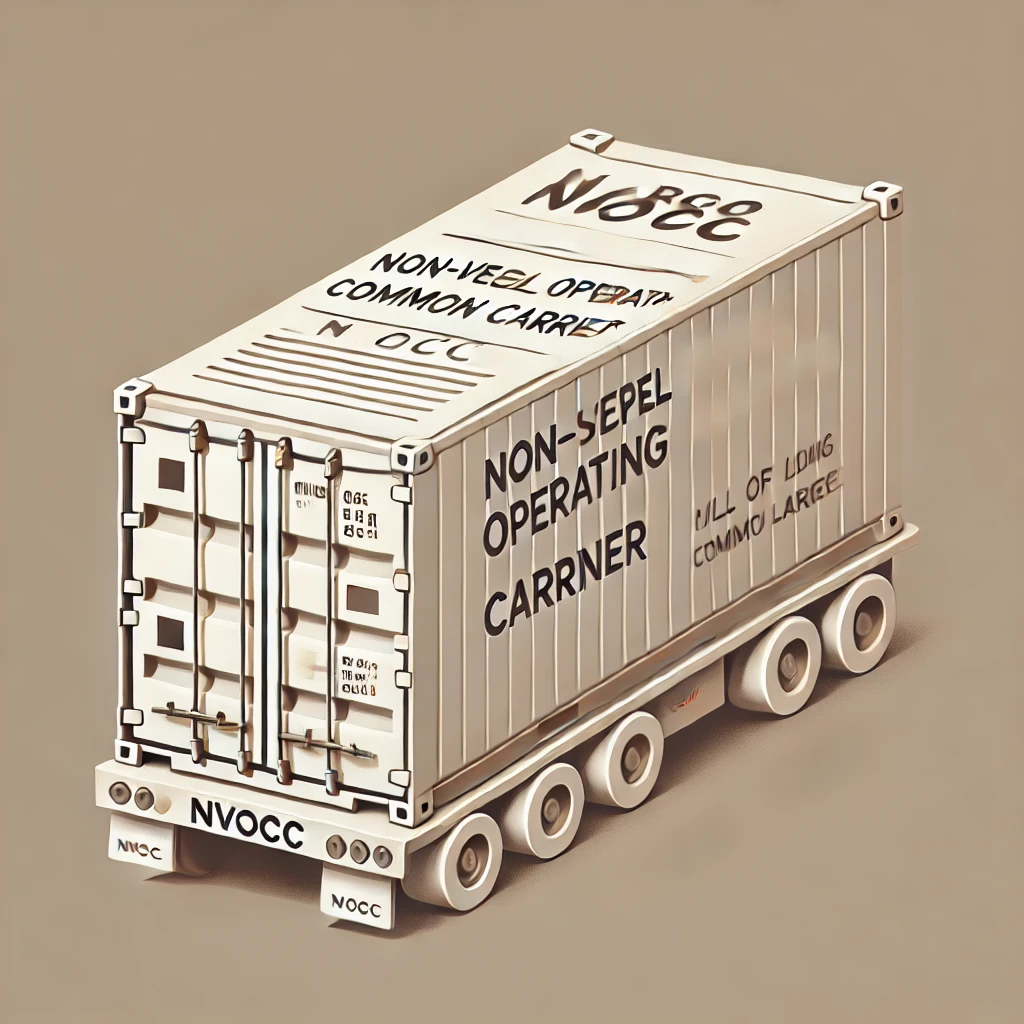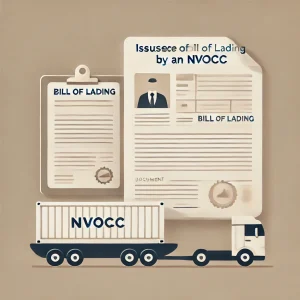NVOCC: The Ultimate Guide to Non-Vessel Operating Common Carriers and NVOCC Licensing

What is an NVOCC?
NVOCC stands for Non-Vessel Operating Common Carrier. To understand this concept fully, let’s break it down:
- Non-Vessel Operating: An does not own or operate its own vessels.
- Common Carrier: It provides shipping services to the general public under published rates and terms.
In essence, an NVOCC is a freight forwarder that acts as a carrier, issuing its own bills of lading or air waybills and assuming responsibility for the shipments.
Key Functions:
- Consolidating smaller shipments into full container loads
- Negotiating rates with shipping lines
- Issuing bills of lading to shippers
- Arranging for transportation of goods
- Providing tracking and tracing services
NVOCC vs. Freight Forwarder
While freight forwarders share some similarities, there are key differences:
NVOCC | Freight Forwarder |
Acts as a carrier | Acts as an agent for the shipper |
Issues its own bill of lading | Uses the carrier’s bill of lading |
Assumes liability for the cargo | Limited liability |
Publishes tariffs | No requirement to publish tariffs |
The Importance of NVOCC License
Operating as an NVOCC in the United States requires obtaining an license from the Federal Maritime Commission (FMC). This license is crucial for several reasons:
- Legal Compliance: It ensures that the operates within the regulatory framework set by the FMC.
- Credibility: A licensed NVOCC is seen as more trustworthy by customers and partners.
- Access to Services: Certain shipping lines and ports may only work with licensed NVOCCs.
- Protection: The licensing process includes bonding requirements that protect customers.
How to Apply for an NVOCC License
Obtaining an NVOCC license involves several steps:
- Register with the FMC: File Form FMC-1 to register as an Ocean Transportation Intermediary (OTI).
- Obtain a Bond: Secure a surety bond or other security as required by the FMC.
- Submit Application: File Form FMC-18 along with the required supporting documents.
- Qualify Individual: Designate a Qualifying Individual who meets FMC’s experience requirements.
- Pay Fees: Submit the necessary application fees.
- Wait for Approval: The FMC will review your application and may request additional information.
License Requirements
To be eligible for an NVOCC license, you must meet several requirements:
- Experience: The Qualifying Individual must have at least three years of relevant experience.
- Financial Responsibility: Maintain a bond or other security of $75,000.
- Character: Demonstrate good character and business integrity.
- Tariff Publication: Publish and maintain tariffs as required by FMC regulations.
FMC License and Regulations
The Federal Maritime Commission (FMC) is the regulatory body overseeing NVOCCs in the United States. Understanding FMC regulations is crucial:
- Tariff Filing: Must publish and maintain tariffs.
- Bonding: Maintain a bond or other form of security.
- Service Contracts: Can enter into service contracts with shippers.
- Financial Responsibility: Demonstrate and maintain financial responsibility.
FMC OTI List
The FMC maintains an Ocean Transportation Intermediaries (OTI) list, which includes licensed NVOCCs. Being on this list provides:
- Verification of license status
- Increased visibility to potential clients
- Compliance with regulatory requirements
Software and Technology
In today’s digital age, NVOCC software plays a crucial role in managing operations efficiently. One highly recommended solution for NVOCCs is Linbis Logistics. This comprehensive software platform offers a range of features designed specifically for the needs of NVOCCs and freight forwarders:
- Booking Management: Linbis Logistics streamlines the booking process with carriers, allowing for quick and efficient management of shipments.
- Documentation: Generate and manage bills of lading, commercial invoices, and other essential shipping documents with ease.
- Rate Management: Keep track of carrier rates and manage your own tariffs effectively, ensuring competitive pricing and compliance with FMC regulations.
- Tracking and Tracing: Provide real-time shipment tracking to customers, enhancing transparency and customer satisfaction.
- Financial Management: Handle invoicing, accounts receivable, and payable all within one integrated system.
- Customs Compliance: Linbis Logistics helps ensure compliance with customs regulations, reducing the risk of delays or penalties.
- Reporting and Analytics: Generate insightful reports to analyze your business performance and make data-driven decisions.
- Cloud-Based Solution: Access your data and manage operations from anywhere, at any time.
By utilizing a robust NVOCC software like Linbis Logistics, can:
- Improve operational efficiency
- Reduce manual errors
- Enhance customer service
- Ensure regulatory compliance
- Scale their business more effectively
When choosing software, it’s important to consider factors such as ease of use, scalability, integration capabilities, and customer support. Linbis Logistics stands out in these areas, making it an excellent choice for NVOCCs of all sizes.

NVOCC Companies: Industry Landscape
The NVOCC industry is diverse, with companies ranging from small specialized operators to large multinational corporations. Some key players include:
- Expeditors International
- Kuehne + Nagel
- DHL Global Forwarding
- DB Schenker
These NVOCC companies offer a range of services beyond basic freight forwarding, including:
- Customs brokerage
- Warehousing and distribution
- Supply chain consulting
- Specialized cargo handling
Challenges and Opportunities for NVOCCs
Operating as an NVOCC comes with both challenges and opportunities:
Challenges:
- Regulatory compliance
- Rate volatility in the shipping market
- Competition from both traditional and digital freight forwarders
- Managing customer expectations in a complex supply chain
Opportunities:
- Growing global trade volumes
- Increased demand for specialized shipping services
- Technological advancements enabling more efficient operations
- Ability to offer end-to-end supply chain solutions

The Future of NVOCC Industry
The industry is evolving rapidly, driven by several trends:
- Digitalization: Adoption of blockchain, AI, and IoT technologies
- E-commerce Growth: Increasing demand for efficient cross-border shipping
- Sustainability: Focus on green shipping and carbon footprint reduction
- Consolidation: Mergers and acquisitions reshaping the industry landscape
How to Choose an NVOCC
For shippers looking to work with an NVOCC, consider the following factors:
- Licensing and Compliance: Ensure the NVOCC is properly licensed and FMC compliant.
- Service Network: Evaluate their global network and service coverage.
- Technology: Assess their technological capabilities, including tracking and documentation.
- Specialization: Look for NVOCCs with experience in your specific industry or cargo type.
- Customer Service: Consider their reputation for customer support and problem-solving.

NVOCC vs. VOCCs
While NVOCCs play a crucial role in the shipping industry, it’s important to understand how they differ from Vessel Operating Common Carriers (VOCCs):
NVOCC | VOCC |
Does not own vessels | Owns and operates vessels |
Buys space from VOCCs | Sells space to NVOCCs and shippers |
Offers flexible services | Operates on fixed routes and schedules |
Can consolidate cargo | Typically handles full container loads |
Conclusion: Navigating the World of NVOCCs
Non-Vessel Operating Common Carriers play a vital role in the global shipping and logistics industry. By understanding what an NVOCC is, the importance of licensing, and the regulatory landscape governed by bodies like the FMC, businesses can make informed decisions about their shipping strategies.
Whether you’re considering becoming an NVOCC, applying for an license, or simply looking to work with one, this guide provides a comprehensive overview of the key aspects you need to know. From the application process for an license to the latest trends shaping the industry, being well-informed is crucial in the complex world of international shipping.
Remember, the shipping industry is constantly evolving, with new regulations, technologies, and market dynamics emerging regularly. Staying updated with these changes and working with reputable, licensed NVOCCs can help ensure smooth, efficient, and compliant international shipping operations.
Whether you’re a shipper looking for flexible shipping solutions or an entrepreneur considering entering the business, understanding the intricacies of this industry is the first step towards success in the global marketplace.
